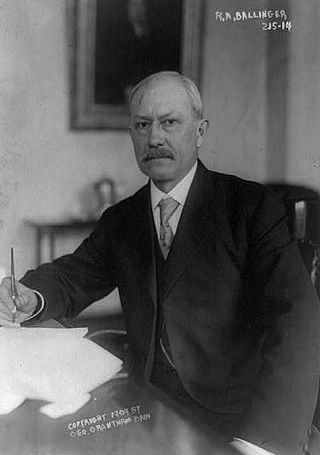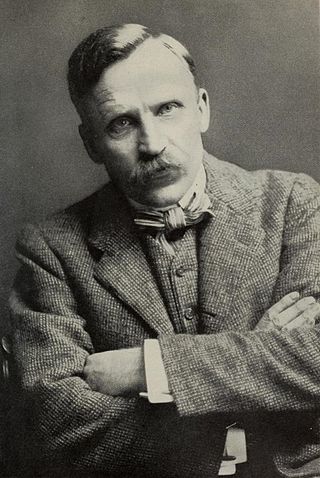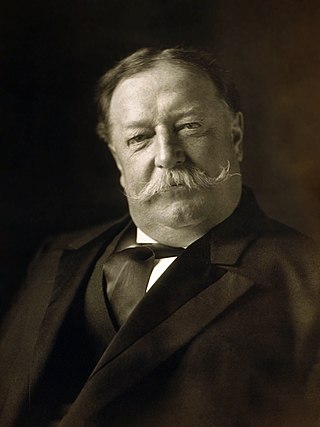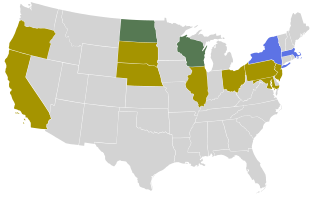
Theodore Roosevelt Jr., also known as Teddy or T. R., was the 26th president of the United States, serving from 1901 to 1909. Roosevelt previously was involved in New York politics, including serving as the state's 33rd governor for two years. He served as the 25th vice president under President William McKinley for six months in 1901, assuming the presidency after McKinley's assassination. As president, Roosevelt emerged as a leader of the Republican Party and became a driving force for anti-trust and Progressive policies.

William Howard Taft was the 27th president of the United States, serving from 1909 to 1913, and the tenth chief justice of the United States, serving from 1921 to 1930. He is the only person to have held both offices.

The Payne–Aldrich Tariff Act of 1909, named for Representative Sereno E. Payne (R–NY) and Senator Nelson W. Aldrich (R–RI), began in the United States House of Representatives as a bill raising certain tariffs on goods entering the United States. The high rates angered Republican "progressive" faction, and led to a deep split in the Republican Party.

Joseph Lincoln Steffens was an American investigative journalist and one of the leading muckrakers of the Progressive Era in the early 20th century. He launched a series of articles in McClure's, called "Tweed Days in St. Louis", that would later be published together in a book titled The Shame of the Cities. He is remembered for investigating corruption in municipal government in American cities and for his leftist values.
The Square Deal was Theodore Roosevelt's domestic program, which reflected his three major goals: conservation of natural resources, corporate law, and consumer protection.

Richard Achilles Ballinger was mayor of Seattle, Washington, from 1904–1906, Commissioner of the United States General Land Office from 1907–1908 and U.S. Secretary of the Interior from 1909–1911.

The Pinchot–Ballinger controversy, also known as the "Ballinger Affair", was a dispute between high level officials in the U.S. government regarding whether or not the federal government should allow private corporations to control water rights, or instead cut them off so that the wilderness would be protected from capitalist greed. Between 1909 and 1910, the dispute escalated to a battle between President William Howard Taft and ex-president Theodore Roosevelt. Pinchot and his allies accused Ballinger of criminal behavior to help an old client of his and thus promote big business. Ballinger was eventually exonerated but the highly publicized dispute escalated a growing split in the Republican Party. Taft took control of the Republican Party in 1912, but Roosevelt started a third "Progressive" party. Both Taft and Roosevelt were defeated in the three-way 1912 presidential election, with Democrat Woodrow Wilson the winner.

Doris Helen Kearns Goodwin is an American biographer, historian, former sports journalist, and political commentator. She has written biographies of numerous U.S. presidents. Goodwin's book No Ordinary Time: Franklin and Eleanor Roosevelt: The Home Front in World War II won the Pulitzer Prize for History in 1995. Goodwin produced the American television miniseries Washington. She was also executive producer of "Abraham Lincoln,” a 2022 docudrama on the History Channel. This latter series was based on Goodwin's Leadership in Turbulent Times.

Samuel Sidney McClure was an American publisher who became known as a key figure in investigative, or muckraking, journalism. He co-founded and ran McClure's Magazine from 1893 to 1911, which ran numerous exposées of wrongdoing in business and politics, such as those written by Ida Tarbell, Ray Stannard Baker, and Lincoln Steffens. The magazine ran fiction and nonfiction by the leading writers of the day, including Sarah Orne Jewett, Mark Twain, William Dean Howells, Joel Chandler Harris, Jack London, Stephen Crane, William Allen White and Willa Cather.

The 1912 Republican National Convention was held at the Chicago Coliseum, Chicago, Illinois, from June 18 to June 22, 1912. The party nominated President William Howard Taft and Vice President James S. Sherman for re-election for the 1912 United States presidential election.

The Progressive Party, popularly nicknamed the Bull Moose Party, was a third party in the United States formed in 1912 by former president Theodore Roosevelt after he lost the presidential nomination of the Republican Party to his former protégé turned rival, incumbent president William Howard Taft. The new party was known for taking advanced positions on progressive reforms and attracting leading national reformers. The party was also ideologically deeply connected with America's radical-liberal tradition. After the party's defeat in the 1912 United States presidential election, it went into rapid decline in elections until 1918, disappearing by 1920. The "Bull Moose" nickname originated when Roosevelt boasted that he felt "strong as a bull moose" after losing the Republican nomination in June 1912 at the Chicago convention.

The presidency of William Howard Taft began on March 4, 1909, when William Howard Taft was inaugurated as 27th president of the United States, and ended on March 4, 1913. Taft was a Republican from Ohio. The protégé and chosen successor of President Theodore Roosevelt, he took office after easily defeating Democrat William Jennings Bryan in the 1908 presidential election. His presidency ended with his landslide defeat in the 1912 election by Democrat Woodrow Wilson, after one term in office.

From January 23 to June 4, 1912, delegates to the 1912 Republican National Convention were selected through a series of primaries, caucuses, and conventions to determine the party's nominee for president in the 1912 election. Incumbent president William Howard Taft was chosen over former president Theodore Roosevelt. Taft's victory at the national convention precipitated a fissure in the Republican Party, with Roosevelt standing for the presidency as the candidate of an independent Progressive Party, and the election of Democrat Woodrow Wilson over the divided Republicans.

Team of Rivals: The Political Genius of Abraham Lincoln is a 2005 book by Pulitzer Prize-winning American historian Doris Kearns Goodwin, published by Simon & Schuster. The book is a biographical portrait of U.S. President Abraham Lincoln and some of the men who served with him in his cabinet from 1861 to 1865. Three of his Cabinet members had previously run against Lincoln in the 1860 election: Attorney General Edward Bates, Secretary of the Treasury Salmon P. Chase and Secretary of State William H. Seward. The book focuses on Lincoln's mostly successful attempts to reconcile conflicting personalities and political factions on the path to abolition and victory in the American Civil War.
Malcolm Frank Venville is a British photographer and film director.

Candace Groth Fleming is an American writer of children's books, both fiction and non-fiction. She is the author of more than twenty books for children and young adults, including the Los Angeles Times Book Prize-honored The Family Romanov and the Boston Globe–Horn Book Award-winning biography, The Lincolns, among others.
This bibliography of Theodore Roosevelt is a list of published works about Theodore Roosevelt, the 26th president of the United States. The titles are selected from tens of thousands of publications about him.

Theodore Roosevelt is a 2022 American television documentary miniseries directed by Malcolm Venville. The two-part miniseries chronicles the life of Theodore Roosevelt, the twenty-sixth President of the United States and premiered on May 30, 2022, on History.

Leadership in Turbulent Times is a 2018 book by Doris Kearns Goodwin and was published by Simon & Schuster. The book covers the lives and leadership skills of four US Presidents Goodwin previously studied: Abraham Lincoln, Theodore Roosevelt, Franklin D. Roosevelt, and Lyndon B. Johnson.

The Fitzgeralds and the Kennedys is a 1987 book written by Doris Kearns Goodwin and published by Simon & Schuster. It covers two Boston Irish American families, the Kennedys and the Fitzgeralds, from John F. Fitzgerald's baptism to John Fitzgerald Kennedy's inauguration. Upon its release, the book's insightfulness and detail were generally praised by several publications. However, in 2002, The Weekly Standard determined that the book plagiarised three other books, which were subject to criticism.

















